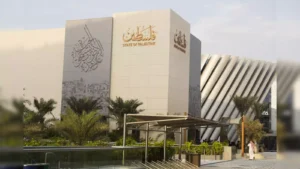The United Arab Emirates has emerged as a key player in both regional and international politics, availing full benefit from its strategic location combined with considerable economic might. It is one of those mushrooming economic powers in the Middle East that shapes global discourses and influences international relations through strategic diplomacy backed by strong economic programs.
The UAE’s Strategic Location and Its Political Influence
Indeed, the UAE enjoys an exclusive advantage owing to its geographical positioning at the crossroads between Europe, Asia, and Africa. The United Arab Emirates is located on the southeastern tip of the Arabian Peninsula and along major maritime routes, hence an indispensable nexus insofar as global trade is concerned. Its strategic location bolsters not only its role in the area of global trade but also its voice in the region’s politics.
Situated between the East and the West, UAE managed to turn its geography into the art of establishing its position as an indispensable partner-not just for global powers but for quite a number of regional players. Its ports, among which Jebel Ali Port in Dubai takes the leading place, have been facilitating this flow of goods and developing economic relationships between major regions, far beyond the Middle East.
Economic Strength as a Means
One of the important pillars on which UAE influence has been established, both regionally and internationally, is the country’s economic strength. While the country has forged an economy diversified from a basic one reliant on oil, tourism, finance, and technology are some of the important sectors on which it has concentrated. In this way, such diversification bolsters the economic resiliency of the country and broadens its diplomatic reach.
Economic Diplomacy and Global Partnerships
The broad international partnerships and investment similarly reflect the economic power of the UAE. For instance, the UAE has invested millions of dollars in almost each country in Africa, Asia, and Europe towards developing its economic relations and influence in those regions. Most of these investments will be strategic to ensure the supplies of resources, drive economic growth, and forge political alliances.
This is further a pointer to the economic might of the UAE, considering its participation in international organizations and forums like the World Economic Forum, United Nations, among other global bodies where active participation in deliberation on global affairs and policy making is a visible trait. Similarly, large investments in renewable energy projects, such as the Masdar City initiative, indicate the commitment of this country to sustainable development, an exhibition of influence in shaping global environmental policies.
Regional Politics: The Mediator and Power Broker
The UAE has carved out a niche for itself, becoming the indispensable mediator and power broker in regional politics. Its interventions have been addressed in most instances as a means of conflict stabilization and forging of cooperation between Middle Eastern nations. The UAE’s diplomatic involvement with Yemen, Libya, and Sudan typifies the role which the nation tries to play as a stabilizing influence in the region.
For example, the UAE has been quite active in the Yemen war through leading a coalition of Arab states against Houthi rebels. Such commitment not only underlines its seriousness about regional security but also underlines the capacity of the UAE to shape geopolitical dynamics within the Arabian Peninsula.
Furthermore, the peace deals brokered by the UAE and opening up dialogue channels across conflicting parties constitute the hallmark of its diplomatic prowess. The recent efforts toward normalizing relations with Israel through the Abraham Accords represent a structural about-turn in geopolitics within the Middle East, hence reflecting its leading role in forging impactful alliances and driving regional transformation.
Tapping into Soft Power and Strategic Alliances

The UAE uses soft power in various ways, balancing its foreign politics with cultural and educational initiatives. Events such as Expo 2020 Dubai add to the investments in institutions like the Louvre Abu Dhabi, further raising the UAE’s global profile and engendering international goodwill. Actions along this line simply promote additional reputation as a modern and progressive state, provide avenues for diplomatic engagements, and offer room for economic cooperation.
It has forged strong strategic ties based on mutual self-interest and shared values of interest in counterterrorism, economic cooperation, and technological innovation with major world powers, including the United States, China, and European countries. The UAE is effectively positioning itself with the global powers for worldwide stability, especially in its aspiration to take on a leading role in the molding of international policy.
The Rise of the UAE onto the Global Stage
The United Arab Emirates is one of the best examples, proving just how profitable it is to raise the level of geographical location and strong economy to the country’s status in international and regional politics. Due to the fact that from those assets the country knew how to make capital, it has become in a short time one of the significant participants on the world arena and takes active part in diplomatic relations, building of economic partnerships, and changing of geopolitical dynamics.
The country is literally ready to take up much more significant responsibility in regional and international politics, as it upscales diplomatic outreach with the expansion of its economic footprint. Strong initiatives for economic engagement combined with the strategic location of the country have thus enabled the UAE not only to handle the wrinkles of international politics but also to set benchmark examples in how nations can capitalize on their strengths in order to achieve high ends in politics.
In a nutshell, the UAE’s journey feeds into underlining the changing nature of international politics shaped on an imperative basis by economic strength and strategic positioning. As the UAE further cements its influence, its role in regional and international politics will doubtless continue to be a focus of interest and importance.
